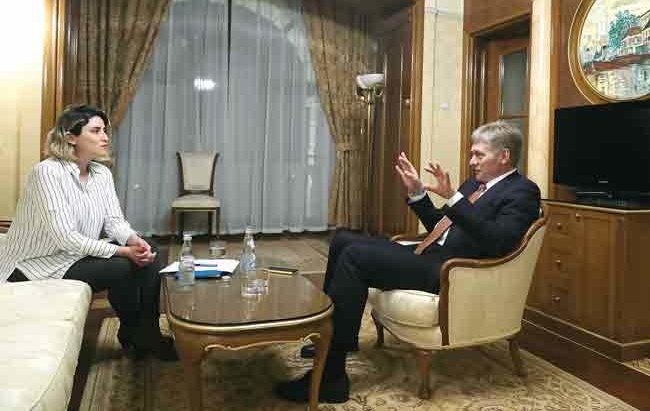Kremlin spokesman Dmitry Peskov speaks with Turkish daily Hürriyet, Sochi, Russia, February 2019
Facing political uncertainty in Syria’s northeast, Russia has put out a statement balancing between local Kurdish groups, Turkey, and the Assad regime.
President Vladimir Putin’s spokesperson Dmitry Peskov issued the statement in an interview with the Turkish daily Hürriyet, published yesterday but conducted after last week’s summit between Putin, Turkish President Recep Tayyip Erdoğan, and Iranian counterpart Hassan Rouhani.
Kurdish groups control about 27% of Syria, in the north and east, after the US-supported Syrian Democratic Forces pushed out the Islamic State. However, Turkey considers the Kurdish militia YPG, the leading faction in the SDF, as “terrorists” linked with the Turkish Kurdish insurgency, and Donald Trump has ordered the withdrawal of the American troops alongside the Kurdish fighters.
Bashar al-Assad tried to exploit the situation on Sunday, calling on the Kurds to accept regime protection but rejecting their demand for autonomy.
Assad Presses Kurds to Accept Regime Takeover of Northeast Syria
Peskov told Hürriyet:
Everyone is in favor of Syria’s territorial integrity and they are ready to do their very best to protect it. However, on the other hand, everyone finds Turkey’s security demands legitimate.
In his balancing act, the Kremlin official rebuffed Turkish President Erdoğan’s proposal of a 32-km deep “safe zone” along the Turkish-Syrian border and across the Kurdish cantons of Kobani and Cezire, demanding the withdrawal of all YPG militia. But he invoked the 1998 Adana Agreement, in which the regime of Bashar al-Assad’s father Hafez promised Turkey that no PKK members would be allowed in northern Syria.
Peskov said that, under the agreement, “Turkey can carry out cross-border operations and doing so is deemed legal.”
He indicated that Moscow will press the Assad regime to allow Ankara’s military action: “Damascus at the time said that if there is something bothering you, if you see terrorists on our soil, you can conduct a cross-border operation by entering to a certain degree.”
A Lever to Take Over Idlib?
Meanwhile, Peskov pointed to Russia’s support of Turkish operations in the northeast as a lever for a free hand to take over opposition areas in the northwest, notably Idlib Province.
When the interview asked a further question about “an operation to the east of the River Euphrates” in Kurdish-controlled territory, Peskov changed the subject, falsely presenting the rebel faction Ahrar al-Sham as “terrorist”:
There is also the matter of Idlib….On the downside, the terrorist threat, Ahrar al-Sham, in Idlib has reached an alarming level. They are continuously attacking the armed forces of Syria. But it is Turkey’s responsibility to prevent these attacks.
In September, Russia and Turkey announced a 15 to 20-km deep demilitarized zone around Idlib and northern Hama Provinces, where more than three million Syrians — about 20% of the country’s remaining population — live. The agreement suspended an imminent Russian-regime operations to overrun the area.
Despite the accord, Assad regime forces have continued bombardment of civilian sites inside Idlib and northern Hama, including deadly shelling since last Friday.
Syria Daily, Feb 18: Assad Regime Continues Bombardment of Idlib Civilians
In their summit in southern Russia, Putin, Erdoğan, and Rouhani did not mention the bombardment.
Instead, Putin said, “We should not put up with the presence of terrorist groups in Idlib.” And on Sunday, Deputy Foreign Minister Sergey Vershinin said that “any compromise with terrorists in Syria’s Idlib is impossible and they must be eliminated”.
Peskov’s statement points to the Russian tactics to distort the local situation to justify a possible offensive — resisted so far by Turkey, whose forces are alongside rebels in the northwest.
The rebel faction Ahrar al-Sham is now a marginal faction in Idlib, after it was pushed back by the hardline jihadists Hay’at Tahrir al-Sham in 2017.
HTS includes the faction Jabhat Fatah al-Sham (Jabhat al-Nusra), formerly linked to Al Qa’eda. While it holds much of the province, other areas — including the cities of Khan Sheikhoun and Ma’arat al-Num’an, bombarded by the Assad regime — are governed by local authorities opposed to HTS.
Peskov erased that reality while pressing Ankara to allow moves against the opposition area:
The terror base there should not grow. If it continues to grow it will threaten the overall peace process in Syria. It has already reached that level….
We should leave [the decision on operations] to our military experts. We do need an operation, but we have to decide on whether it will be Turkey’s operation or some other countries’. We should not hope to make a deal with the children of Ahrar al-Sham. That is a false hope, they are terrorists, they are al-Nusra, they are the children of Al Qa’eda.

